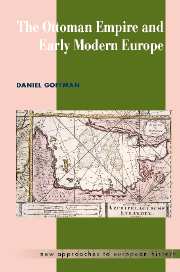Book contents
- Frontmatter
- Contents
- List of illustrations
- List of maps
- Preface
- Acknowledgements
- Note on usage
- Chronological table of events
- The Ottoman House through 1687
- 1 Introduction: Ottomancentrism and the West
- Part 1 State and society in the Ottoman world
- Part 2 The Ottoman Empire in the Mediterranean and European worlds
- Kubad in Venice
- 5 The Ottoman–Venetian association
- Kubad between worlds
- 6 Commerce and diasporas
- Kubad ransomed
- 7 A changing station in Europe
- 8 Conclusion: The Greater Western World
- Glossary
- Suggestions for further reading
- Index
- NEW APPROACHES TO EUROPEAN HISTORY
Kubad ransomed
from Part 2 - The Ottoman Empire in the Mediterranean and European worlds
Published online by Cambridge University Press: 05 June 2012
- Frontmatter
- Contents
- List of illustrations
- List of maps
- Preface
- Acknowledgements
- Note on usage
- Chronological table of events
- The Ottoman House through 1687
- 1 Introduction: Ottomancentrism and the West
- Part 1 State and society in the Ottoman world
- Part 2 The Ottoman Empire in the Mediterranean and European worlds
- Kubad in Venice
- 5 The Ottoman–Venetian association
- Kubad between worlds
- 6 Commerce and diasporas
- Kubad ransomed
- 7 A changing station in Europe
- 8 Conclusion: The Greater Western World
- Glossary
- Suggestions for further reading
- Index
- NEW APPROACHES TO EUROPEAN HISTORY
Summary
The greatest troubles I have had from [the Turks] have been caused by the men of Senj, who pass in their barks beneath Morlacchia toward Obrovac, come ashore, and do great damage to the Turks, who say that Your Serenity is responsible for guarding them from the sea, and demand that we give them recompense. And so I have chased the Senjani and the said uskoks as much as I have been able.
It was not until almost two years after Lepanto that Kubad finally was homeward bound toward his beloved metropolis. The war between the Catholic holy league and the Ottoman Empire had sputtered along for over a year after the conquest of Cyprus and the battle off Lepanto. During that time, Kubad remained in Venice, first as prisoner and then as negotiator. The Ottoman captive received many visits from Grimani in the weeks after Lepanto. At first, it was clear, the venerable Venetian nobleman was dropping by merely to gloat. Gradually, however, the tone of his conversation changed, as he discussed with unease the contrast between a becalmed Venetian arsenal and one in Istanbul that reportedly hummed with unparalleled bustle. In early April, 1572, an edgy Grimani advised Kubad of the rumored launch at the arsenal in the Golden Horn of a fleet of some 200 refurbished and newly built galliots, galleys, and other vessels.
News from the wider world soon confirmed Grimani's fears that Lepanto would prove a sterile victory.
- Type
- Chapter
- Information
- The Ottoman Empire and Early Modern Europe , pp. 189 - 191Publisher: Cambridge University PressPrint publication year: 2002



